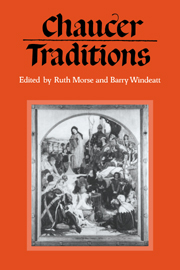Book contents
- Frontmatter
- Contents
- List of contributors
- Preface
- Note on the text
- 1 Chaucer traditions
- 2 Gower–Chaucer's heir?
- 3 Chaucer and Lydgate
- 4 Hoccleve and Chaucer
- 5 Chaucer and fifteenth-century romance: Partonope of Blois
- 6 Some Chaucerian themes in Scottish writers
- 7 The planetary gods in Chaucer and Henryson
- 8 Gavin Douglas: ‘Off Eloquence the flowand balmy strand’
- 9 Skelton's Garlande of Laurell and the Chaucerian tradition
- 10 Chaucerian metre and early Tudor songs
- 11 Aspects of the Chaucerian apocrypha: animadversions on William Thynne's edition of the Plowman's Tale
- 12 The shape-shiftings of the Wife of Bath, 1395–1670
- 13 The genius to improve an invention: transformations of the Knight's Tale
- 14 From the Clerk's Tale to The Winter's Tale
- 15 The Virtuoso's Troilus
- 16 Rewriting romance: Chaucer's and Dryden's Wife of Bath's Tale
- 17 Chaucer's religion and the Chaucer religion
- 18 A list of the published writings of Derek Brewer
- Index
6 - Some Chaucerian themes in Scottish writers
Published online by Cambridge University Press: 23 September 2009
- Frontmatter
- Contents
- List of contributors
- Preface
- Note on the text
- 1 Chaucer traditions
- 2 Gower–Chaucer's heir?
- 3 Chaucer and Lydgate
- 4 Hoccleve and Chaucer
- 5 Chaucer and fifteenth-century romance: Partonope of Blois
- 6 Some Chaucerian themes in Scottish writers
- 7 The planetary gods in Chaucer and Henryson
- 8 Gavin Douglas: ‘Off Eloquence the flowand balmy strand’
- 9 Skelton's Garlande of Laurell and the Chaucerian tradition
- 10 Chaucerian metre and early Tudor songs
- 11 Aspects of the Chaucerian apocrypha: animadversions on William Thynne's edition of the Plowman's Tale
- 12 The shape-shiftings of the Wife of Bath, 1395–1670
- 13 The genius to improve an invention: transformations of the Knight's Tale
- 14 From the Clerk's Tale to The Winter's Tale
- 15 The Virtuoso's Troilus
- 16 Rewriting romance: Chaucer's and Dryden's Wife of Bath's Tale
- 17 Chaucer's religion and the Chaucer religion
- 18 A list of the published writings of Derek Brewer
- Index
Summary
The title of ‘Scottish Chaucerians’, which used to be applied to a number of the Scottish poets of the fifteenth and early sixteenth centuries, seems now to be almost defunct, and deservedly so, since it always did more harm than good, not only because it suggested an exaggerated degree of dependence, but also because by focussing attention on what is simply one strand – although an important one – in the Scottish literary tradition it distracted attention from the extraordinary variety of that tradition. Even though the ravages of time have left the surviving evidence in fragments, enough remains to show that the literature was far more extensive and varied than the conventional procession of ‘Chaucerian’ makars – King James, Henryson, Dunbar and Douglas – might suggest.
There is certainly no doubt that the presence and influence of Chaucer was an important one, especially for those two fifteenth-century poets who seem most deeply and most interestingly involved with his work, King James and Robert Henryson – though their treatment of him is distinctive and original. It is a pity, however, that much of the discussion of Chaucer's influence on the later writers of Scotland has tended to regard it as predominantly or exclusively ‘rhetorical’ or stylistic in nature. Again, there is here a basic truth which is being exaggerated – like their English counterparts, Scottish writers do praise Chaucer's verbal skills and his role in the adornment of the poetic vernacular.
- Type
- Chapter
- Information
- Chaucer TraditionsStudies in Honour of Derek Brewer, pp. 81 - 90Publisher: Cambridge University PressPrint publication year: 1990



